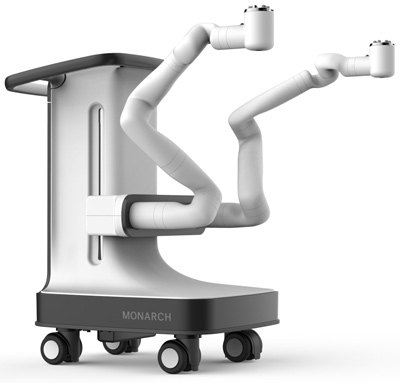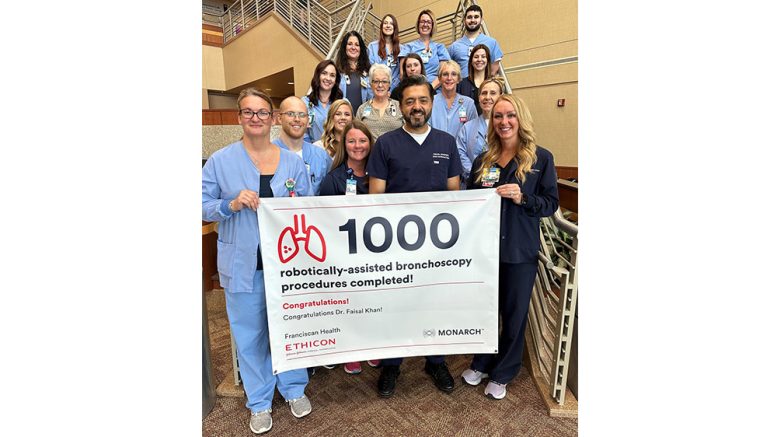For four years, doctors at Franciscan Health Cancer Center Indianapolis have been using a novel technology that detects lung cancer in patients early and paves the way for immediate treatment.
These experts recently reached a new achievement by treating their 1,000th patient, making Franciscan Health the first health care system in Indiana and one of only a few in the nation to attain this high-level volume using this technology.
They did so using the MONARCH Robotic Platform from Ethicon, a Johnson & Johnson MedTech Company. The system probes the inside of lungs and obtains tissue samples for biopsy. The system, which has been in use at Franciscan since 2019, integrates the latest advancements in technology using a familiar controller-like interface – appearing much like a hand-held game device – and combines views inside the lung with computer-assisted navigation based on 3-D models of a patient’s own lung anatomy. The system provides pulmonologists with continuous bronchoscope vision throughout the entire outpatient procedure.

The MONARCH robot used to take tissue samples for biopsies to detect lung cancer earlier. (Photo provided)
“This technology and approach have been invaluable in our ability to provide the best care possible for our patients,” said Faisal Khan, MD, one of the few board-certified interventional pulmonologists in Indiana. “This platform is more precise and provides improved reach, vision and control during bronchoscopic procedures, which helps us access the hardest-to reach areas of the lung where most lung cancer nodules start to form. As a result of detecting cancerous nodules as early as possible, it offers our patients more hopeful outcomes.”
According to the American Cancer Society, the five-year survival rate for overall lung cancer is just 22 percent. This is most likely because in the majority of cases, the disease is not detected until advanced stages. When found in the localized stage, the five-year survival rate increases to 60 percent.
Dr. Khan cited a recent study published in BMC Pulmonary Medicine that he is principal investigator of, and Franciscan Health participated in. This study demonstrated that robotic bronchoscopy is achieving desired outcomes with minimal risk. He added that the study was done before Franciscan began integrating a Cone Beam CT scan with the MONARCH procedure in the past two years.
“That is improving the performance of the robotic platform even further. It allows us to accurately go after even smaller lesions on the lung,” Dr. Khan said.
While there are a variety of diagnostic options currently available for lung cancer, all have limitations on accuracy, safety, or invasiveness. Such limitations can lead to false diagnoses or side effects such as collapsed lung and hemorrhage, which increase health costs and extend hospital stays. Robotic bronchoscopy reduces these complications and increases the accuracy of diagnosis. It also allows physicians to find cancer earlier, often in the localized stage.
Click here to see how the Auris Health MONARCH Platform system works. Click here for a video with more information about the platform’s use at Franciscan Health.
Learn more about Franciscan Health’s lung cancer programs and lung screenings at FranciscanHealth.org/campaigns/lungcancer.

